HidingOut

Johannes Vermeer - Girl Reading a Letter by an Open Window (circa 1657–59)
Hiding
I'm hiding, I'm hiding
And no one knows where;
For all they can see is my
Toes and my hair
And I just heard my father
Say to my mother -
"But, darling, he must be
Somewhere or other;
Have you looked in the inkwell?"
And Mother said, "Where?"
"In the INKWELL?"said Father. But
I was not there.
Then "Wait!" cried my mother —
"I think that I see
Him under the carpet." But
It was not me.
"Inside the mirror's
A pretty good place."
Said Father and looked, but saw
Only his face.
"We've hunted," sighed Mother,
"As hard as we could
And I am so afraid that we've
Lost him for good."
Then I laughed out aloud
And I wiggled my toes
And Father said —"Look, dear,
I wonder if those
Toes could be Benny's?
There are ten of them, see?"
And they WERE so surprised to find
Out it was me!
Dorothy Keeley Aldis
"They mostly don't seem to notice, anyhow."
By the time I graduated from Junior High, I had become a near master at HidingOut. The normal social pressures there had easily convinced me that I was eminently vulnerable, and I quickly learned the costs of too prominently standing out. My identity had been emerging through my tenure there, and I'd tried on innumerable different personas, quickly discovering which I could get away with and which I could not. Mistakes would receive quick and shockingly viscous peckings back into place, as if angry ducks ruled that roost. I learned to go slightly unconscious, to simply not notice much of the brutality surrounding me, for I could not imagine surviving otherwise. Each morning I performed another act of rather sublime courage, arriving on time and taking my seat just as if I was not entering a grand inquisition. I worked hard to remain unsuspicious, since suspicion alone usually served as adequate evidence that some punishment should resume. Teachers were no less unforgiving than the least of the students, for they were charged with creating future citizens from such continually unpromising material. The principal daily announced another threat over the Stalag-quality PA system, insisting that his was "a promise, not a threat." Everyone knew a threat when they heard one.
I went on to do post-graduate work in high school and beyond, and by the time I'd finished high school (or it had finished with me), I had attained a depth of transparency such that I could see right through myself, the ego had been pretty much beaten out of me.
Shirker
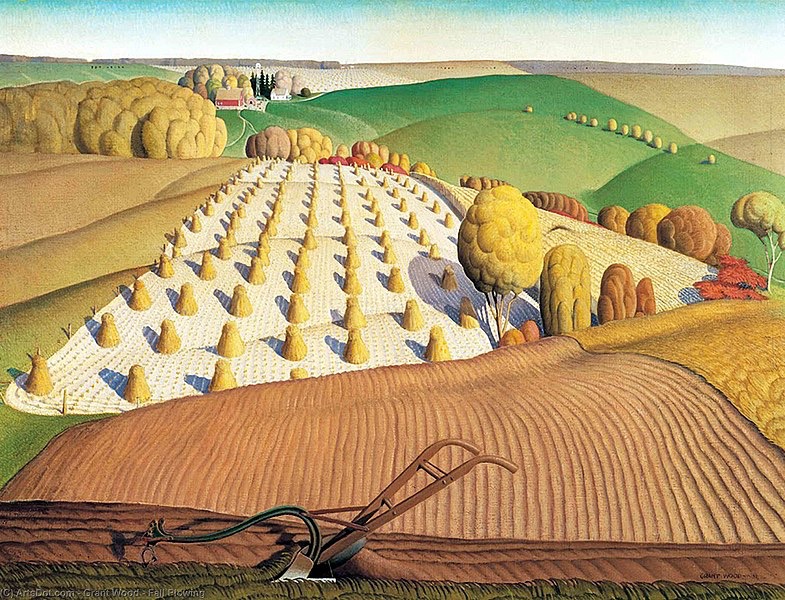
Grant Wood: Fall Plowing (1931)
"I get away with nothing."
I know myself to be, above all else, a Shirker. In my time, I've left many more jobs undone than I ever completed. I'm apt to spend a day when I should be engaging in my equivalent of Fall Plowing, plowing my way through a novel in lieu of attempting to outrun the first snow outside. I tend to leave a lot on the table. I think of myself as being more able than I ever actually deliver. I shrink in the face of even modest challenges, and I feel myself defeated at the merest rumor of conflict. I contend that I am not lazy, however, for the lazy never seem to notice the work they shirk, but fail to catch the cues that inform then that they really should be doing something. Mine's a more sophisticated sort of slothfulness, one ridden with essential guilt and built upon a solid foundation of dedicated precedent. I can usually tell when I first sense a deadline whether or not I'll ever manage to get around to actually attempting to accomplish it, but I retain the expectation on my books, never writing off the obligation. Ever! I might have become most masterful at managing the resulting residue of guilt, my constant companion and, curiously, my primary inspiration.
I sense time on my tail and I know for sure that I will ultimately lose this race.
Factsation

RAPHAEL: The Sacrifice at Lystra c.1515-6
"How low can your bottom line go?"
The Muse recalls her mom insisting that fare is what one pays to ride the bus. This glib insight almost explains how the much-maligned US Tax Code works in practice, except that fair, tax-wise, means that those least able to pay, always pay the most as a percentage of their income. A day laborer, lacking the 'tax advantages' of owning a private jet, might pay the full fare. No billionaire ever does, nor need to, because he can take advantage of receiving certain advantages not extended to the laborer. Billionaires complain about the price, but never, ever, under any circumstance, ever pay the full fare. It's as if the rich receive special dispensation for the otherwise insufferable burden of wealth. They write off with abandon, carrying forward losses to offset any unfortunate future profits. Lose a billion early in a career, and you're golden for the next couple of decades worth of tax years. Walk away from a failing enterprise, even one you ruined through gross incompetence, and your government will richly reward you. Should the laborer walk away from a job, he'll be denied subsistence support under the presumption that he must be lazy. Real welfare queens live in luxury on the Upper East Side.
Our President, he whose name I've sworn to avoid saying, reportedly deducted $70,000 in a single year for hair styling expenses, since his gravity-defying cantilevered combover is apparently a part of his brand rather than simply a translucent inability to accept encroaching baldness.
QuantiCategorization
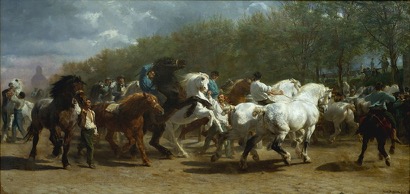
Rosa Bonheur: The Horse Fair (1855)
"I am not now nor have I ever actually been my demographic."
To produce sketches for her mid-nineteenth century painting The Horse Fair, artist Rosa Bonheur sought and received permission to dress as a man while observing dealers selling horses at the horse market held on the Boulevard de l'Hôpital in Paris. She explained that when earlier sketching at a slaughterhouse, her appearance as a woman had complicated her ability to observe regular goings on, and so she wanted to dress in the iconic smock and britches favored by male painters of the period, for she considered herself first an artist. Whatever else she might have been ranked a distant second to her presence as an artist in that context. How others perceive us can deeply affect our ability to engage in whatever we do, so most of us take care to project a persona congruent with our intentions, lest we unduly complicate our own efforts.
We live in perhaps the most prejudicial time in the history of human existence.
MountainTime

Giovanni Segantini: The Punishment of Lust (AKA The Punishment of Luxury) (1891)
" … my soul will most certainly feel more at home there."
Though I might use the same clockworks to measure time wherever in the world I might find myself, time behaves differently in different places. It moves much more slowly some places than in others, the effect influencing clocks such that they fail to register any difference. I do. Perhaps you do, too. A minute is clearly not a minute everywhere. In cities, time naturally moves more quickly, though much of it seems wasted in transit between two inevitably distant points (across town) via crowded passageways. One waits much of their time away in cities. On the prairie, time moves most regularly, with little difference from day to day to day. I figure that the featureless topography influences it, as if there's nothing for it to bounce off of as it passes through. MountainTime seems most mysterious and therefore most special. Long, deep shadows render sundials essentially useless, and twilight, both morning and evening, stretches far beyond expectations, smearing each sunrise and sunset into curiously extended events.
I consider the Pacific Time Zone to be God's Own Time Zone, probably because I gestated and was born there, and inhabited that geographical space through my formative years.
ThinAir
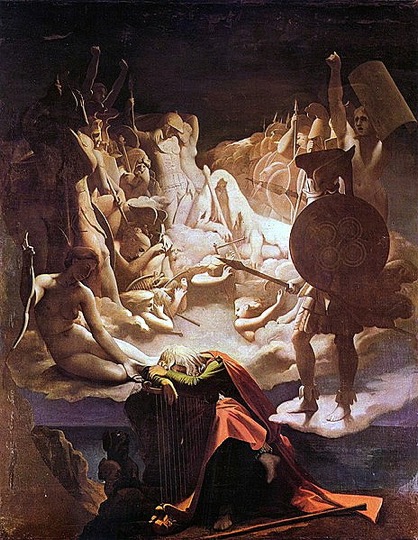
Jean Auguste Dominique Ingres: The Dream of Ossian (Ossians' Traum) (1813)
"Maybe this place exists solely as refuge …"
The atmosphere has seemed memorably thick over the last few weeks. Wildfires raging across The West pushed smoke around the world, blocking some people's sun through the end of summer and into an uneasy autumn. Our horizons have flamed through successive sunrises and sunsets while every exposed surface accumulated an ashy grit. Politics, too, have densified our social atmosphere, with fear sweat creating a persistent ground fog of dread as a mortally weakened President throws distracting tantrums, spewing idle threats. The Damned Pandemic continued playing off our tenacious innumeracy, a flickering flame quietly spreading through virgin timbre, our ears deafened by disbelief. This time will be recorded as neither the best nor the worst of times, but it might well be remembered as a crime wave, with thieves weakening every institution and corruption seemingly corroding everything it touches, and touching pretty nearly everything. The future from here appears cloudy with the certainty of torrential rains, a threatening Old Testament scenario.
The Muse and I feel fortunate to have found Pilgrimage calling us up and out of our metastasizing daily routines into ThinAir, where we can't figure out how to make the television work.
MisDisInformation

Joseph Wright: The Corinthian Maid (1782-1784)
[Josiah Wedgwood, the pioneer of pottery manufacturing, commissioned this mythological scene that illustrates the invention of the art of modeling bas-relief sculpture. Wedgwood’s own fired-clay vessels, decorated with low reliefs, would have been seen by an eighteenth-century audience as the aesthetic descendants of this ancient Greek maiden’s attempt to preserve her beloved’s profile.
The girl was the daughter of a potter in Corinth. Her boyfriend was about to embark on a perilous journey to foreign lands, taking only his spear and dog. As a memento, she traced her sleeping lover’s silhouette onto the wall. Her father then used the drawing to model a clay relief, which he baked in his kiln to create a ceramic keepsake.] NGA.gov
"The silhouette was never the lover …"
When the fabled Corinthian Maid traced her lover's silhouette, she had no intention of accurately representing him, but of hopefully capturing some significant, representative part of his presence. She understood that the small subset of his many dimensions she traced on that wall would fall far short of replacing him in his absence, but hoped the resulting bas relief might serve as enough reminder to spark some deeper sense of him than mere memory might provide. She produced information about him, but without the expectation that this information might adequately replace him. Her work produced a placeholder for his presence, information without definition.
We've been wrestling to make this distinction ever since, and probably well before that Corinthian Maid scribbled her lover's outline on that wall.
Pilgrimage
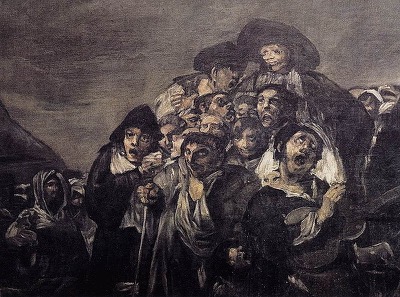
Francisco de Goya y Lucientes - A Pilgrimage to San Isidro (between 1820 and 1823)
[The theme of the loss of identity in crowds in this painting can be seen as a precursor to expressionist painting (en.wikipedia.org)]
"Having left as someone else, he returns with his freshly blessed self again."
It might be a curiosity unique to the criminal mind to believe in the concept of a clean getaway, for there are none. One might wish there were such a thing, and even deeply believe that they have pulled one off, but once fleeing, the possibility of getting caught remains until you're arrested, and until then, you're haunted by the prospect of being found out, more refugee than free. I suppose the more dedicated sociopaths can convince themselves that they got away Scott-free, but even they are actually fleeing, even if they don't acknowledge this fact. If only they could leave themselves behind like they left the scene of the crime, they might actually escape. The fundamental problem with getaways lies in trying to flee one's self, but that one cannot be left behind. The old life might be readily abandoned, but the old self insists upon tagging along, and the old self, however unwanted by the prospective escapee, shows up on wanted posters and the gunman cannot help but drop into old haunts. Somebody will sooner or later spot them there.
Contrary to every airline advertisement ever written, there are no getaways, not really.
Viewing

Samuel Dirksz van Hoogstraten: View of a Corridor (1662)
"Let the record show that on this last day of summer, I started leaning in again."
The Muse and I live near the top of a minor mountain in a region filled with more significant ones. Ours hardly merits mentioning, but still our elevation often leaves us feeling as if we're floating above much of the rest of creation, like Greek gods or something. We nevertheless choose to live humbly here, something I believe we'd do whatever our circumstance, and we've actually lived even more humbly before, accepting waning as another part of an apparently never-ending cycle of increase and decrease, like respiration. 'As I live and breathe' translates into 'sometimes we give and sometimes we receive', with net increase or decrease more a matter of accounting periods than of any superiority or shortcoming. We do our work, grateful for having it, and too often temporarily forget the sublime beneficence of both possessing it as well as often feeling utterly possessed by it, for it fails to consume us, but seems instead insistently intent upon continually enriching us, even when it makes us no money. Living without purpose could only be worse for everybody.
That said, we're both feeling bled dry here on this final partial day of summer.
Dire
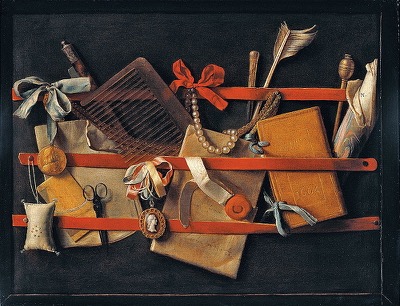
Samuel Dirksz van Hoogstraten: Tromp-l'oeil still life, 1664
"What strange lives we lead."
Our lives seem anything, everything but still. Even under This Damned Pandemic forcing us to march in place, we continue marching in what we firmly believe to be a forward trajectory, making progress, as the old saying insists, through Dire circumstances. I daily subject myself to a fresh edition of The Times, lest I fall uninformed regarding the form of the latest insults. I scroll my newsfeeds, continuously on the lookout for whatever must be coming next. I know for certain that something's stalking me, stalking us, because it seems, when I take a quiet moment to reflect, that 'twas always thus. Even back in what I now nostalgically recall as simpler times, complex threats continually surrounded me. My immune system's always been on high alert and trending ever higher, it seems, and were it not for my continuously-sounding early alert systems, I might well have already succumbed to one thing or another, some humiliation or bother. The fresh threats seem to invent ways to bushwhack me. Well, not exactly me, precisely, but us excluding me personally, for while we continually feel threatened, only a few of us ever actually fall prey, and it seems as though it's a different collection every day. Our society seems increasingly comprised of entropy spiraling ever more chaotically.
Some headlines chase me away, offering information I cannot quite afford to know.
BegendingsAgain
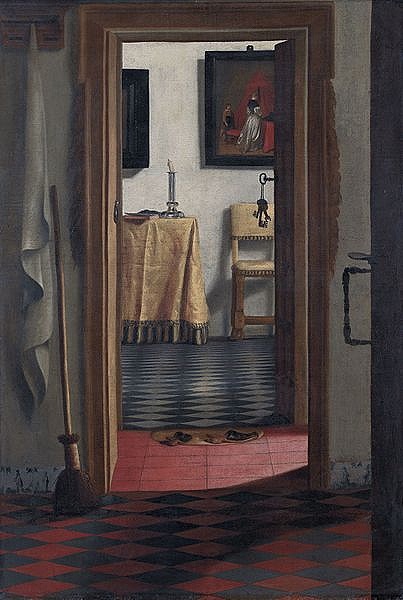
Samuel van Hoogstraten: View of an Interior, or The Slippers (Between 1654 and 1662)
"I clutch my innate cowardliness along with my pearls and move into."
I consider myself to be a change chicken, especially whenever encountering some inevitable. I could offer a master class in the fine art of denial. My feet naturally drag, providing a superpower resistance few very deeply appreciate. I can defend any late status quo state until long after any foreign element's completely overtaken it. I sometimes seem to be living in the past, still taking my cues from some long ago code of comportment. I live conservatively—not politically conservatively, for that philosophy always seemed far too radical for me—but intellectually conservatively, and also culturally. I rightfully consider most improvements to be degradations and most new beginnings to be primarily shrouded in endings. My glass is neither half empty nor half full, but still overflowing with potential. I'm the one most likely to order another one just like the one before.
I have been inhabiting the NowHere for an entire quarter now, or almost.
DateNight
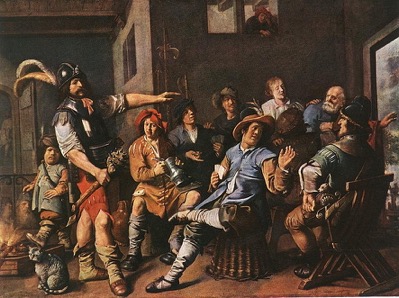
Jan Miense Molenaer: The Denial of Saint Peter (1636)
[Molenaer depicted biblical stories in his own time and surroundings,
such as representing this scene from Peter's Gospel set in a Dutch Tavern.]
" … settling in with The Maximum Cat to dream about different days …"
Denver's not so much a food desert as a food prairie. Restaurants tend toward the predictable and steady, and seem few and far between. Little mystery lurks within any of them. Reservations, not usually necessary, unless, of course, you really want to get in at a specific time without waiting. Noise, like an incessant prairie wind, seems built in, and any visit tends toward the buffeting. Our damned pandemic has slowed the usual progression of people in and out, with most preferring an outside table, but even then, overcrowding seems a prominent feature of those few more choice options still open, especially those not featuring a drive-in window. The Muse and I have simply foregone any kind of eating out other than the very occasional take-out pizza, a prominent feature of the region's flat restaurant topography, anyway. But last Friday night, we really needed to get the heck out of our same old place after months of in-house suppers, crafted by our very own hands and inspired by flattening imaginations in precisely the same space. We behaved like the cats, screaming to be let out but with no destination imagined other than Not Here.
With no specific place in mind, not exactly the recipe for certain satisfaction, though back in the day, we could usually happen upon some semblance of a satisfactory place.
Impendings

Sir Peter Paul Rubens The Reconciliation of Jacob and Esau About 1625 - 1628
"I left only NowHeres behind."
Summer has been eroding since early July, wasting away in place. The Dog Days came and went, replaced by a succession of cat days, warm enough that the cats preferred to stay out unsupervised all night and started turning feral again. Max, The Maximum Cat, disappeared for two successive nights before suddenly appearing without an explanation, hungry. I, of apparently little faith, had already started imagining how I might cope with such a loss, here in this ass end of a sweet season, with so many competing Impendings already scheduled. The end of summer enters with stealth exceeding even that of the littlest cat's feet. It leaves no footprints at all and manages to surprise no matter how closely I watch my clocks and calendars. Perhaps especially this year, where so much has managed to maintain so much sameness backdropped by so danged much simply staying home. The Muse and I have been aching for a road trip, but circumstances or entropy have so far successfully stymied every attempt. Big change is coming, though. I know this because I feel unusually blind to the Impendings.
The first day of fall has been scheduled to appear on a Tuesday this year, slipped into midweek as if to discourage any leading or trailing long weekend celebration.
-finity

Wanderer above the Sea of Fog by Caspar David Friedrich (1818)
" … hope apparently actually does spring eternal…"
I have never considered myself an atheist, but then, I wouldn't call myself anti-theist, either. I believe in plenty and can recognize the utility embodied in the whole mythology, liturgy and all. I was raised attending a mid-century conservative Christian denomination, demons and all, and learned early of which I was better off not speaking about at all. I could not quite muster up even a half-decent belief in an old testament God, the one that looks like Moses' scowling uncle wearing a swaddling suit of so-called clothes reminiscent of nothing more than a onesie diaper ensemble with sandals; thank God, no socks. Always the sandals. The relationships between God as father and Jesus as the son of God and me as the apparent son of a mild-mannered postal worker and his I Love Lucy wife were about as clear as my father's family tree, swelling with halves and steps and even more baffling progeny. The idea of lord, let alone as savior, escaped me, and not just because I didn't believe, but because I simply could not, since I had not been raised in feudal times, understand the meaning of the terms. Still, I never really felt as if I was entirely on my own, for I always possessed an inner hopefulness, even in my most discouraging times.
I believe that hopefulness might represent what some more devout and comprehending mean when they speak of big 'G' God.
Stewing

A group of peasants sharing a simple meal of bread and drink;
Livre du roi Modus et de la reine Ratio, 14th century.
"My country used to be …"
They are a proud people, overly so. They expend their energies defending themselves, for they seem to attract enemies, foreign as well as domestic, and they insist that these enemies primarily target their 'Way of Life,' which they seem to hold as sacred without ever very finely defining what it entails other than to declare it containing inalienable rights, not necessarily privileges, responsibilities, or obligations, and 'traditional values.' They seem to firmly believe that owning a semi-automatic rifle and a handgun will protect them from tyranny, if not necessarily from each other. They insist that registering or licensing those weapons amounts to the tyranny from which those weapons were supposed to protect them. They distrust governments, which they firmly believe to be the primary author of the tyranny they oppose. They proudly proclaim that they refuse to expose themselves to mainstream media, which they believe engages in an ongoing conspiracy to misrepresent what's actually going on. They believe themselves to be authentic representatives of The People, The REAL People, not those hangers-on and Johnny-come-lately folks diluting the gene pool. They receive their information almost exclusively via gossip and rumor, and once they get an idea in their heads, they blithely deflect any conflicting information. Point them at a fact checker and they will proclaim, without evidence, that fact checkers have been proven unreliable. They live within an echo chamber.
They seem a stupid people but believe themselves cleverer, more insightful, wiser.
PinchOfSalt

Antonio del Pollaiolo: Battle of the Naked/Nudes, 1470
" … just when we really needed to be tipped over again."
I was blessed with little taste for salt. My lead palate cannot discern whether a dish needs salt before serving, so The Muse performs that service in the event that we have company for supper and this detail even matters. The Muse keeps the salt cellar handy at table to make up whatever deficit I deliver for dinner. I try, as the cookbooks show, to let salt start to breakdown proteins before cooking, but I work by direction rather than by taste or instinct, because I possess no salt sense. I'm aware that a man of my advancing age should limit my salt intake, but I find no reason to monitor it since I'm most likely to just forget about it altogether. I take it, though, that some find an extra pinch of salt necessary, though I have resigned myself to never understanding why. The Muse also possesses a superior taste for wine and can sense the presence of corking I cannot perceive. I sometimes doubt whether we're the same species, as divergent as our sensibilities seem.
Last week, The Muse leaned over and salted the GrandOtter's already plated supper after suddenly realizing that she'd forgotten to salt it in preparation.
Patruns
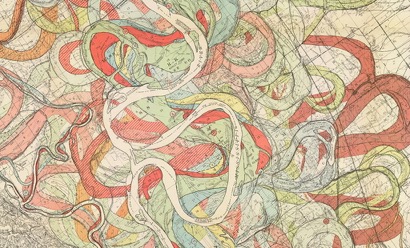
US Army Corps of Engineers geologist and cartographer Harold Fisk: Meander Map of the Mississippi River (1944)
"Give the Patrun a silly name and see where that leads."
Us consultants types often speak about organizational patterns of behavior, just as if an organization could behave. Often (as in always), a consultant type like me will stroll around a workplace simply observing. We might linger to chat with folks as we meander around, but any observer observing this observer might readily conclude that we're aimlessly wandering. We're actually aimlessly collecting clues to what the people working within this place do when they aren't aware of doing much of anything at all. The consultant was invited in, usually under false initial pretenses, because someone's experiencing a difficulty. Successive improvements have typically failed to completely reverse disappointing results, so the consultant's engaged in a late-stage attempt to finally get a handle on it (or resolution's described in one of an infinite array of hackneyed non-descriptive phrases, each of which essentially screams, "We have no clue what to do.) Neither do the consultants, at least not at first. A walk-about might provide a few clues, though, as certain patterns might come into sharper focus. Later, sitting with the client, the consultant will engage in another "Did you notice?" conversation, where some scales might start falling from over the client's eyes.
Though organizations, not being people, are incapable of behaving, certain patterns of engagement or outcome strongly suggest the presence of some underlying behaviors.
MisFunction
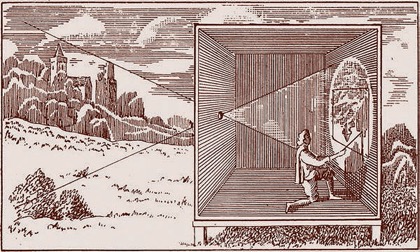
Engraving of a "portable" camera obscura in Athanasius Kircher's Ars Magna Lucis Et Umbrae (1645)
"Camera obscura (plural camerae obscurae or camera obscuras, from Latin camera obscūra, “dark chamber”), also referred to as pinhole image, is the natural optical phenomenon that occurs when an image of a scene at the other side of a screen (or, for instance, a wall) is projected through a small hole in that screen as a reversed and inverted image (left to right and upside down) on a surface opposite to the opening." Wikipedia
"Who's to say?"
Historians have recently concluded that seventeenth century Dutch painter Johannes Vermeer sort of cheated when he painted. Rather than merely observing his subjects, they speculate that he most probably employed a Camera Obscura which projected a full color image upside down on his canvas, thereby presenting a paint-by-number sort of template for him to simply fill in with color. This revelation suggests that he might have been more draftsman than artist, though his shortcut did nothing to infringe upon the sheer beauty of his work, which capture light in truly remarkable ways. But every art has its supposed-to-bes, it's hallowed, gentrified traditions, and mere photographic replication was never acknowledged as the point of either art or artistry. A master artist was supposed to possess a certain transcendent magical sense allowing production without resorting to what purists might consider cheap mechanical tricks. Yet what is the eye but a camera obscura, with the brain righting and coloring in inverted images? We see as we do due to a considerably more complex mechanism than any simple hole in a wall, and it's a genuine wonder any of us could make any sense of anything we ever saw, let alone, agree upon proportion, color, or placement.
MisFunction seems common in all sensory processing: vision, hearing, you name it.
TheRhodeIsland
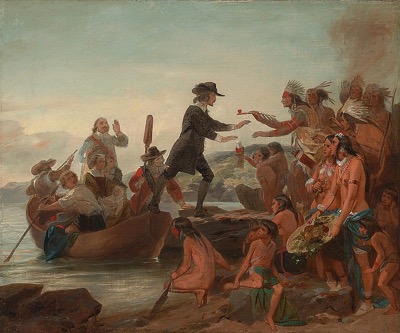
Alonzo Chappel: The Landing of Roger Williams in 1636 (1857)
"As tiny as that measure might seem, it's far too large to calculate any human affect …"
The standard calibration for natural disasters in the United States has long been TheRhodeIsland. Whether measuring hurricane or hail damage, government agencies as well as our print and broadcast media exclusively employ TheRhodeIsland as the universal unit of measure of size. True devastation rarely affects less than a single Rhode Island-sized area, and seems to often spread into dozens, occasionally scores. To clarify, TheRhodeIsland represents an area equivalent to the square mileage encompassed by our former colony and tiniest state, which roughly equals the size of a typical ex-urban McMansion estate, or, one Ponderosa, that fictional ranch featured in the sixties western television series, though both The McMansion and The Ponderosa feature far less distinct boundaries than TheRhodeIsland. In spite of this state enjoying the representation of two US Senators, it features fewer bathrooms than the typical McMansion. Fun Fact: It was also the birthplace of the most radical concept in governance ever to visit this continent, or, indeed, the world: Tolerance, a practice now long fallen into regrettable disuse.
Oregon ignites, and the resulting wildfire consumes several Rhode Islands overnight.
Revelations
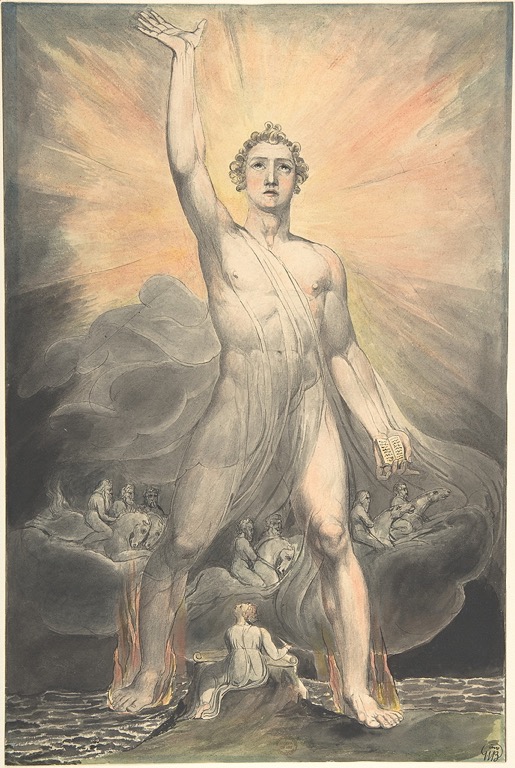
William Blake: Angel of the Revelation, ca. 1803–5
"I'm continuously moved to reflect just how unlike expectations Revelations always seem."
I seem to be living through a time where another shoe's always just waiting to drop, plots infinitely thickening, where every blessed thing I think I understand today might just be turned on its head tomorrow. I cannot honesty testify that my experience was ever different from this before, for I remember, like you remember, strings of surprising Revelations accompanying me from my earliest days, but it seems, reflecting, that the velocity just might have been steadily, subtly increasing over time, combining to produce a now dizzying result. Every damned thing seems swathed in speculation, with little probability that I'll readily recognize the upcoming outcome, which seems very likely to spawn just another interim and not any final resolution. We say that things are "up in the air," but this air seems thin and smoky, not necessarily fresh or health-giving, but sometimes more bordering upon the absolutely smothering. It probably doesn't help that we're living with a presidency produced like one of those shoddy "reality" television series, where each commercial break (and there suddenly seems to be endlessly infinite breaks for commercials) follows a fresh take on Keep-Away, almost revealing, but then, once again reporting that we'll just have to wait. They promise a brief break, but each invariably takes longer than any average attention span. I've lost focus by the time the program resumes, and the promised revelation usually turns out to be another come-on, prolonging what becomes deeply dissatisfying enough to leave me wondering after the higher purpose of my existence; hardly satisfying entertainment. I've been losing my desire to even turn on the damned television or read the Times to discover the latest "Revelations.".
The relationship between Revelations and resolutions seems disrupted right now, and this situation seems to insist upon me adopting some different expectations.
Burning

Camille Corot: The Burning of Sodom (formerly "The Destruction of Sodom"),1843 and 1857
" … one pair of boots I'm sure grateful I remembered to grab before I left."
Around the time I first moved to Portland in the mid-seventies, the Feds changed their policy regarding their Northwest forest land. They'd previously subsidized a vast rural economy. Cut-rate logging leases encouraged an extractive industry that funded schools, roads, and other government services along with high-paying rural jobs. The locals complained that the damned EPA regulations suddenly protecting small owls and tinier fish caused it, the downfall of entire regions. People were understandably pissed when forced to move into cities or settle into lives as the suddenly working poor. They remembered their grandparents' stories about being poor back before The Dust Bowl had brought them here to the promised land. It had been every bit as good as promised to them up until then. Proud traditions were summarily disrupted and the victims usually blamed for their shifting fortunes. They'd age into a bitter conservatism still remembering when and their children would join a local underground militia, fomenting for similar to their own disruption at the top. The same sorry game played out on the other side of the country in the rust belt, as over the following third of a century, jobs evaporated with little recourse. We'd entered a deliberately disruptive time. Now, of course, Oregon's known as The Silicon Forest, though few ex-loggers work in high tech. Many remain up to their necks in debt from barely surviving and still live in once-thriving but ever-shrinking small towns that hardly seem like towns anymore; slightly wider spots along the road over to Bend or K-Falls.
The surrounding woodland was always good to these people, a genuine wonderland of scenery, recreational opportunity, and game.
Issues

Portrait of Martin Luther by Hans Balding Grien, 1521 Woodcut
"We dare not squabble over Issues …"
I take issue with Issues, which seem to have become the primary medium for political discourse, such as it's become. Reporters ask where a candidate stands, offering hardly a thin, brittle branch for any candidate to stand upon. They speak in a curious shorthand where keywords stand in for actual questions. "Where do you stand on abortion?" one might ask, a guaranteed double-binding, damning sort of non-question almost certain to elicit a meaningless response. Abortion has become a poisonous word. Even a sentence fragment containing it seems certain to taint anyone associated with it, for it's become the primary marker of ginned up moral outrage. Nobody ever asks where a candidate stands on preserving the life of a mother, for the unborn seem to have become citizens with rights exceeding any of those enjoyed by the previously born, even though they have universally failed to qualify as citizens at all. Their primary occupation seems to have become sparking outrage, which seems quite the clever accomplishment for anyone having not yet come into this world, let alone of age.
Issues represent the gotcha game of our time.
SolstusInterruptus
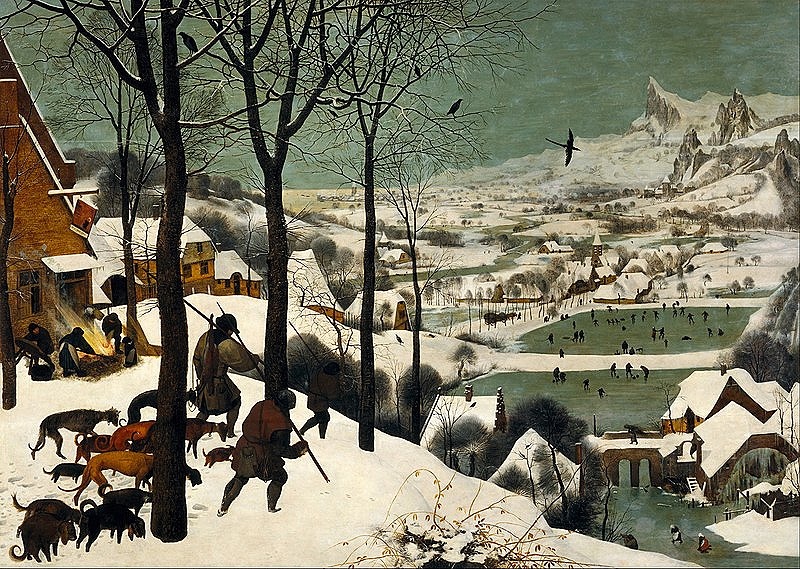
Pieter Brueghel the Elder, The Hunters in the Snow, 1565
" … I suspect it's only napping."
As if mistaking an afternoon for the wee hours, our summer pulled a reversal overnight. Eighty-five and terribly smoky just yesterday, I woke to snow covered ground. Roads remain bare, since we were frying eggs on the asphalt yesterday and it holds heat like a fire brick, but the trees, none even starting to turn autumn colors yet, suddenly inhabit a snow globe. A very small hummingbird visits the remnants of the hummingbird feeder's contents, still liquid, thank heavens. I'd thought to take it down yesterday afternoon as I prepped for this storm. I almost regret that I live in a time when I can know what the morrow will likely beget, for I spent the few days leading into today dreading summer's interruption. I dutifully carried almost every planter and pot to a tarp-covered basement floor, and even blew out the drip irrigation system as if it was suddenly November in early September. A whole season of sitting on the deck surrounded by sweet scented blossoms, undone but not forgotten in a single afternoon. The cats must have thought me crazy, uprooting our outside home on such a hot and smoky afternoon. My back complained, too, after the lifting was through and I was sipping a cold one and surveying the damage I'd done on the rumor of winter.
I remembered wrong when I recalled previous early snows, for twenty years have passed since the last September snowfall here.
Synchroenicheatea
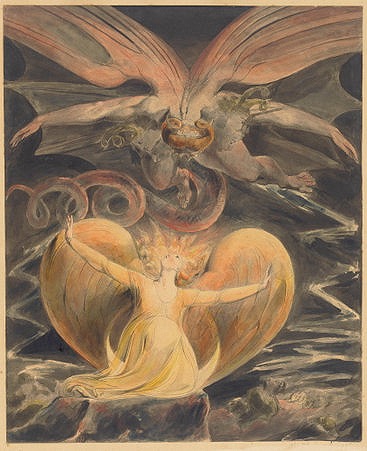
William Blake: The Great Red Dragon and the Woman Clothed with the Sun, c. 1805
"I thank heaven that the most important things tend to happen at the least convenient times."
I yesterday introduced my primary manner of living, LivingAllegorically. In in, I asserted that making meaning comprises the bulk of my life's work, that everything I perceive when looking out any window might prove to be some unlikely mirror image of me, and that it's always my responsibility to interpret whatever I experience in ways that work for me by enhancing the quality of my experience. I omitted at least half of a complete explanation, though, not wanting to muddy up the creek more than necessary to delve into such a deeply personal topic. That other half involves meaningful coincidents' apparent role when LivingAllegorically. Obviously, nobody ever manages to plan moments when a fresh insight appears. These simply seem to simply occur without volition or advanced planning, like the revelation on the road to Damascus that Saul wrote about, which was clearly not on that morning's agenda. It occurred at an apparently inconvenient time and brought what might easily be interpreted as great good fortune to a clearly undeserving character, an authentic plot twist. I believe that LivingAllegorically begs a necessity to consequently maintain a firm belief in Synchronicity, a concept, first introduced by analytical psychologist Carl Jung, which holds that events are "meaningful coincidences" if they occur with no causal relationship yet seem to be meaningfully related. Those meaningful relations seem to describe the mechanism animating LivingAllegorically, which might not be so much a philosophy as a manner of actually living, an endlessly active leaning in sort of engagement with life.
Synchroenicheatea seems to be a more emblematic way for me to spell the word because it seems so much more phonetic and mysterious. However one spells it, it remains a mysterious force, the presence of which won't move any needle on any Galvanometer.
LivingAllegorically

Allegory of Arithmetic, Laurent de La Hyre, 1650
"I might never get to breakfast or Damascus this morning …"
In the unlikely event that any of my grandkids ever ask me what I've learned about life, I would most probably respond by telling them that life seems to me to be an extended allegory, that reality isn't one percent of what it's cracked up to be, and that I believe that making meaning might be my primary responsibility here. Nothing seems as it seems and everything, every sensory experience, every dream, might carry a vast array of alternative meanings, depending. Depending upon me. I deeply doubt that a cigar is just a cigar, even sometimes, but each radiates possibility, depending. Depending upon me. I could choose to render that Freudian smoke to be simply a cigar, but what could possibly be the point of interpreting it so unimaginatively? Better sometimes, I believe, to perceive it with a touch of wonder, to check the context and discover some more meaningful understanding. It could be the clue I'd been hoping to appear that might just lead me to resolve the great mystery, or, alternatively, I could just perceive a mundane old cigar. Vitality, in my panoply, demands this more personal engagement, where I feel obligated to at least try to unwrap some deeper meaning from every blessed event and sensory experience. A rose might well be a rose and also a rose, but I also suppose that it might also be a harbinger of anything, a semi-secret messenger intent upon finally cluing me in. It utterly depends upon me to see through its initial instance to interpret something potentially more significant. All my experiences depend upon me being present.
Saul, when on that fabled road to Damascus, experienced a perfectly Standard Type 1 Revelation.
Humbility

Christ in the Wilderness, Moretto da Brescia (Alessandro Bonvicino), ca. 1520
" … lurching contest to contest, certain only of losing what we already too willingly forfeited."
And it came to pass that the people became prideful, proud of their many accomplishments and haughty within their identity; insufferable in the eyes of their neighbors, even formerly close friends. Where gratitude once swelled in their chests, an insolence replaced it and a definite arrogance overtook them. They suddenly seemed to know better the choices others should make, and even took it upon themselves to lean over others' plates to cut their meat for them without even being asked. How unappreciative 'they' seemed! Polity degraded into a me-ity, a me-for-me-and-nobody-for-all self-centeredness. Invisible hands and "wise" markets subsumed human agency and they segregated financially. They claimed The Best In The World without considering. "For whom?", and were subsumed by the promise of ever-expanding profitability. They funded their military more lavishly than they supported their progeny. They devoted themselves to promoting identity, touted as both brave and free to one another, but seemed to forfeit their former Humbility for a venial form of vanity. Then all was lost.
The ability to humble one's self might be the most human capability.
Readering

Portrait of Georges-Daniel de Monfried by Victor Segalen, 1909
"I'm feeling as if I might be a writer now."
Michael Maccoby, American psychoanalyst and leadership consultant, defined a leader as anyone with followers. Others shave pigs, insisting that some observable skills really must be present to qualify as a real leader, but I take Maccoby's side in this small controversy. It seems to me, if to nobody else, that we define many occupations in just this back-handed way. We judge singers by the size of the audiences they attract and Presidents, initially by the number of votes they get, neither by any even rough assessment of their skill. Some of the most popular recording artists torture my ears, but they're successful based upon their audience, measured by their number of listeners. This principle seems to hold true even beyond the performing arts. What's a doctor without patients? Even a librarian seems to require patrons to qualify as a true professional. Professionalism's not simply what one knows or does, but related to recognitions. Does anyone follow you? Does anyone ever listen when you sing?
Writing's no different.
FlatEarths

Wilbur Glenn Voliva's flat earth map. Modern Mechanics and Invention, October, 1931
"It can well afford to wait until we Flat Earthers catch on to its subtle significance."
In his essay The Relativity of Wrong, [The Skeptical Inquirer, Fall 1989, Vol. 14, No. 1, Pp. 35-44], Isaac Asimov presented a canny reframe of the common right/wrong dichotomy. He provocatively declared Flat Earthers' notions as not so much wrong as incomplete. For the Sumarians, who he supposed had originally concluded that the earth was flat, for most intents and purposes, their world was, in practice, flat. Earth's very slight curvature, about 0.000126 per mile, a quantity very close to 0 per mile, turns out to have been almost right and not, as moderns popularly believe, utterly and totally wrong. The truly tiny difference between zero and 0.000126 (eight inches) per mile compounds, though, as horizons expand beyond the local neighborhood. What remained obscure to the ancients became inescapably obvious to their later progeny. We might even say that most of today's more complete understandings stand atop yesterday's less complete ones. The often infinitesimal nature of significance continues to fool us as it did our forebears. Today, we have tough guys crowding together in Sturgis, apparently because, to the vestigial Sumarian part of their perception, a sub-microscopic virus shouldn't qualify as anything to get all that worried about. Right wing-nut commentators wonder what all the fuss could possibly be if we're 'only' projected to lose six percent of our population to the pandemic, and many of those folks, in their calloused imaginations, were ready to shuffle off anyway.
If this plague year should have taught us anything, it should have convinced most of us that the infinitesimals matter more than we thought.
Measuremont
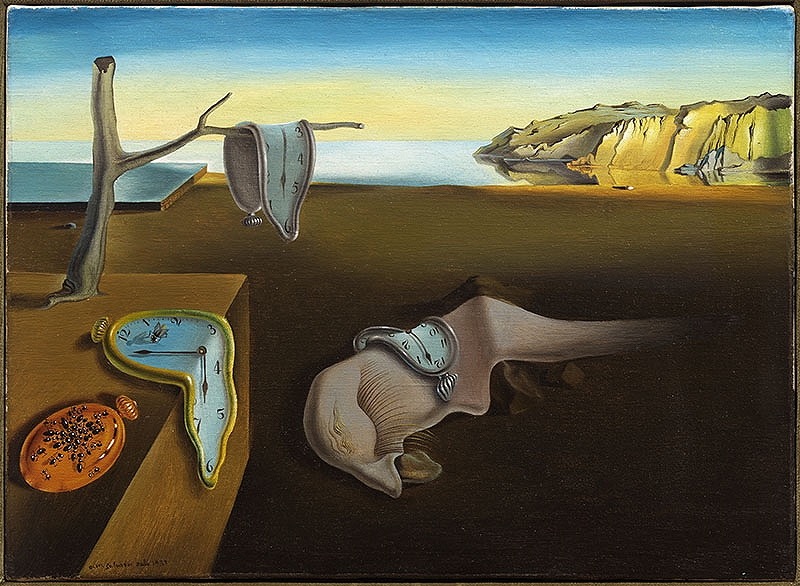
La persistance de la mémoire (The Persistence of Memory), Olive Salvador Dali, 1931
"When engaging in timeless anything, expect expectations to prove misleading."
I can never quite remember at first. The Muse and I bought two more cases of fresh tomatoes thinking we'd roast the contents of one and juice the contents of the other, twenty or thirty pounds each case. We'd 'processed' tomatoes many times before, but those experiences produced little more than vague recollections, not immediately accessible in any functional form. The roasting takes time and includes a cumbersome step where I'm supposed to pull the peel off each hot roasting half, just as if that were humanly possible, while scorching my fingertips. How terribly renewing! Juicing involves little more than coring, quartering, and heating, then crushing in the Foley® food mill, an inherently picky and frustrating business. I finally plug into my vestigial muscle memory and set myself to work, slicing, salting, seasoning, and roasting. The recipe says check after twenty minutes. After twenty minutes, the roasting halves seem unaffected. I set the timer for twenty more minutes and settle into finish that novel while I wait. I repeat this cycle twice more before the tomatoes seem in any way peel-able, then painstakingly set about successfully performing the impossible ritual. I'm more than two hours into what started out as a twenty minute expectation by the time I decide that I'm done roasting and it's time to start canning.
I'd gathered the little jars while the tomatoes roasted, and also set the lids to simmering on the stove top.
WillfulWisdom
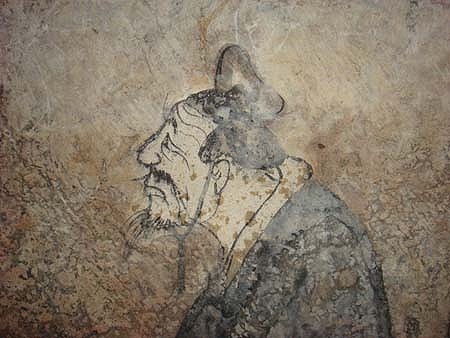
Fresco depicting ancient Chinese philosopher and educator Confucius (551 B.C.-479 B.C.), found in a 2,000 year old tomb in an old residential yard in Dongping County, east China's Shandong Province.
" … we generally do not seem to conform to gross generalizations."
I sincerely wish that there were a wise counterpart to the wave of willful ignorance presently washing over us. Willful Ignorance, for the unfamiliar, is a polite way to describe stupid. It's polite because it presumes adequate intelligence, which only seems fair since measuring anyone's intelligence proves inconvenient and often impossible in the course of a casual interaction, so it concludes that in spite of adequate brain power, someone's apparently worked very hard to come to a delusional conclusion. These delusional conclusions are often quite provably fallacious by employing nothing more dangerous than elementary logic and … ahem … facts, but they tend to spark a childish round of 'call and denial', an equivalent to the old I Know You Are But What Am I? game of our youth. There's no talking with anyone entranced within their own twisted justifications. They've invested heavily in a storyline unsupportable by any rational or experiential means, a genuine flight of fantasy, but apparently will not divest, probably because they cannot without forfeiting a long-trusted element of their identity. I think of Willful Ignorance as a particularly virulent form of denial, a bury-the-head-in-the-sand strategy certain to ultimately betray even the truest of true believers. My usual strategy when encountering the apparently willfully ignorant involves sort of just putting them out to pasture. They do not appreciate my questioning and I don't really need their sideways justifications' lead weight in my life. Neither of us will be in the market for evangelical transformation.
What would a wise counterpart to willful ignorance look like?


